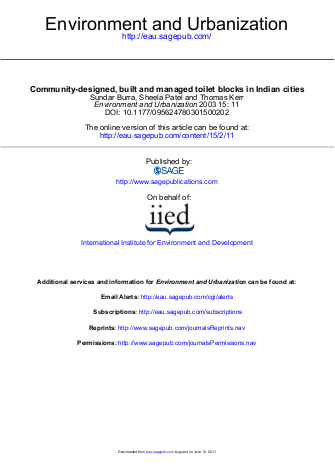
This paper describes the ten-year programme of communitydesigned, built and managed toilet blocks undertaken by urban poor federations and women’s cooperatives, with support from the Indian NGO SPARC. This programme has reached hundreds of thousands of poor urban dwellers with much improved sanitation and facilities for washing; it has also demonstrated how such provision is affordable and manageable for all Indian cities. But this programme has also demonstrated to city authorities the capacity and competence of urban poor organizations, and helped change the relationship between the residents of slums and local government agencies. The paper begins by explaining why sanitation has been neglected, and describes the inadequacies in government sanitation programmes. It then describes the first experiments with community sanitation and the difficult negotiations in many cities, including Mumbai, Kanpur and Bangalore. Then it discusses the major community toilet programmes that developed in Pune and Mumbai. It highlights the innovations that allowed these to work better than previous public toilet blocks, the reasons why the urban poor organizations took on these projects, the lessons learnt and the ways in which community toilet blocks helped address other problems faced by the urban poor.
Resource collections
- Accountability to affected populations (AAP)
- Topics
- UN Habitat - Urban Response Collection
- Urban Response - Urban Crisis Preparedness and Risk Reduction
- Urban Response Collection - Community Engagement and Social Cohesion
- Urban Response Collection - Economic Recovery
- Urban Response Collection - Environment and Climate Change
- Urban Response Collection - Housing, Land and Property
- Urban Response Collection - Urban Crisis Response, Recovery and Reconstruction
- Urban Response Collection - Urban Resilience
